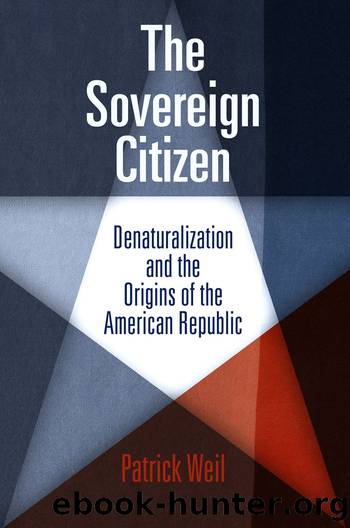The Sovereign Citizen: Denaturalization and the Origins of the American Republic by Patrick Weil

Author:Patrick Weil [Weil, Patrick]
Language: eng
Format: epub
Tags: Civil Rights, Political Science, Law
ISBN: 9780812206210
Google: BoUJwuMmEg4C
Goodreads: 16468903
Publisher: University of Pennsylvania Press
Published: 2012-11-29T00:00:00+00:00
Figure 3. Chief Justice Earl Warrenâs handwritten notes on pages from a stenography pad, probably written between December 31, 1957, and February 5, 1958. Box 582, Warren Papers, Manuscript Division, Library of Congress, Washington, D.C.
Perez + Trop
The opinions should be separated.
Our Perez dissent should be directed to the opinion of the Court which was limited to the voting.
By writing them separately we may get a court in Trop.
There apparently is no such opportunity in Perez.
The draft is a good philosophical discussion but it is almost entirely bereft of authority, or legislative history[.]
It does not deal at all with Hare and Savorgnan[.]
It does not spell out the difference between abandoning citizenship and forfeiture.
The opinion should demonstrate
1. That Congress has never avowedly sought to sustain such action on any enumerated power.
2. It has come in the back door under the guise of regulating citizenship[.]
3. There is no such delegated power in Congress[.]
4. The whole concept of our government is opposed to regulation of citizenship.
5. Whether the concept was of compact, federalism, sovereignty of the individual or some other, citizenship is the basic and inalienable right of the individual.
6. In the constitutional debates, in the Federalist or any other contemporary literature[,] there is no suggestion that Congress be given the right to denaturalize citizens.
7. I am convinced that such a suggestion would have been shocking to the Founding Fathers and the American people.
8. It should still be shocking.
9. It was not even conceded for many years that a citizen could divest himself of citizenship[.]
10. Only our historical background and conflict with other nations led to that conclusion[.]
11. The legislative history of the statutes on the subject does not lead to a contrary conclusion[.]
12. Congress has never directly asserted such a right.
13. Neither has this court recognized it.
14. Hare and Savorgnan show how cautious the court was in permitting expatriation[.]
15. In Perez we should say that we are not dealing specifically with the right of Congress to punish in this manner because the court has chosen to deal solely with the voting issue and not the draft dodging (clearly punishment)[;] we will deal with that in Trop.
16. The majority opinion finds justification in the fact that the petitioner has refused to perform one of the basic responsibilities of govt. There are othersâto pay taxesâto protect the purity of electionsâthe honesty of public officialsâthe involvement of this country in foreign difficulties. (Only a few days ago some men were arrested in Florida who were preparing a ship for arming revolutionists in Cuba[.])38
17. Facts of case[.]
At first blush, Warrenâs extraordinary notes appear to be a reaction to a draft written by a clerk with novel ideas and new instructions on where and how to go next. They are not. Jon O. Newman, who was the senior clerk that year for Warren, never saw these notes. Although Newman did not write this second draft, he would ultimately write the drafts of Warrenâs final opinions in Perez and Trop.39
Indeed, Warren already had his own ideas and convictions regarding the expatriation provisions.
Download
This site does not store any files on its server. We only index and link to content provided by other sites. Please contact the content providers to delete copyright contents if any and email us, we'll remove relevant links or contents immediately.
| Civil Rights | Discrimination |
| General | Human Rights |
Day by Elie Wiesel(2786)
The Age of Genius by A. C. Grayling(2592)
Gideon's Spies: The Secret History of the Mossad by Gordon Thomas(2355)
The Gulag Archipelago (Vintage Classics) by Aleksandr Solzhenitsyn(2106)
FATWA: Hunted in America by Pamela Geller(2013)
Columbine by Dave Cullen(1870)
Men Explain Things to Me by Rebecca Solnit(1729)
The Rule of Law by Bingham Tom(1701)
Anatomy of Injustice by Raymond Bonner(1671)
Examples & Explanations: Administrative Law by William F. Funk & Richard H. Seamon(1649)
Three Cups of Tea by Greg Mortenson(1620)
The Source by James A. Michener(1619)
That Every Man Be Armed by Stephen P. Halbrook(1584)
ADHD on Trial by Michael Gordon(1581)
Future Design by Unknown(1580)
Gideon's Spies by Gordon Thomas(1512)
Palestinian Walks by Raja Shehadeh(1499)
Constitutional Theory by Carl Schmitt(1458)
Nothing to Envy by Barbara Demick(1451)
